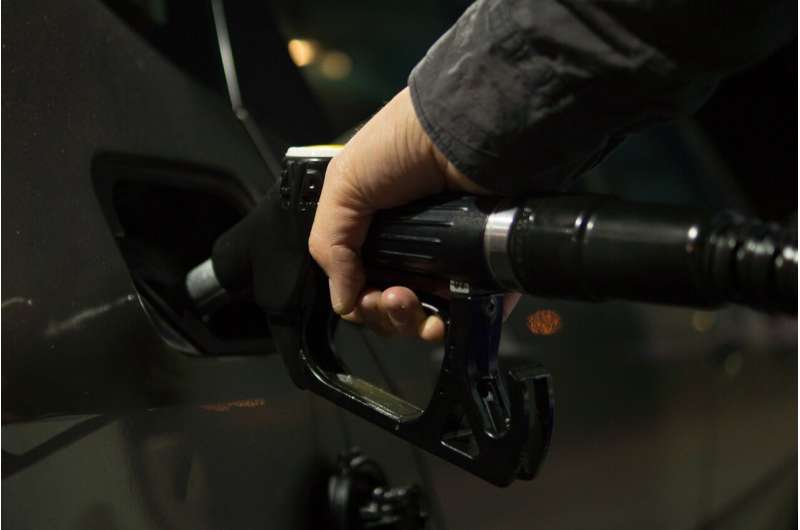This article has been reviewed according to Science X's editorial process and policies. Editors have highlighted the following attributes while ensuring the content's credibility:
fact-checked
trusted source
proofread
Lack of competition between petrol stations hits households most in poorest areas: Study

Households in low-income areas face significantly higher increases in petrol prices when rival fuel stations close compared to high-income areas, according to new research led by the University of East Anglia (UEA).
At the same time, low-income areas do not benefit from a higher drop in prices when new stations open.
The study is published today in the Journal of Industrial Economics. It shows that it matters who operates the petrol stations: large chains respond with higher price increases following the exit of one of their rivals.
Other factors, such as reliance on cars, commuting distance, age, or education also drive some of these findings, but even after accounting for these, the difference between low and high-income households remains.
Lead author Peter Ormosi, Professor of Competition Economics at UEA's Norwich Business School, said, "This difference is striking as it implies that increasing market concentration, or market power, is likely to have a more negative impact on low-income people.
"More rivals mean more competition, and more competition brings down prices. Consequently, when some rivals leave the market, prices tend to increase, and when new ones enter, prices fall on average."
Low-income households spend disproportionately more on petrol—some studies have estimated that 20–30% of the disposable income of low-income households is spent on motor fuel. This means that not only are they exposed to higher price increases with the lessening of competition, as shown in this study, but also that it has a disproportionately larger impact on their budgets, because they spend a larger share of their income on fuel.
To improve our understanding of how the lessening of competitive pressures affects different consumer groups, the researchers looked at how retail petrol prices change in areas where petrol stations shut down, and in areas where new stations open.
The study used 15 years of station-level motor fuel price data from Western Australia, information on instances of local market exit and entry, and details of the socio-economic characteristics of the areas studied.
The researchers were able to look at not just the average impact of lessening or intensifying competition, but how this differed depending on local demographics.
"There are various reasons why this difference exists," said Prof Ormosi. "We believe the main one is to do with how much consumers engage with the market, for example how much they seek out better deals."
It has long been understood that differences in consumer engagement can lead to different prices even for the same products. The study found that there are various potential reasons why people in low-income areas engage less with the market. These include:
- Lack of short-term alternatives—when petrol stations shut down in an area, it leads to a larger increase in the price in areas with more reliance on cars. It is conceivable that in low-income areas people are less able to swap their cars for alternative means of transport.
- Educational levels and age—although lower income households are also more likely to be lower on educational attainment and have lower financial literacy, the study areas with low educational levels still experienced a larger price increase even after controlling for income. Age played a similar role. Areas with a larger proportion of older residents experience a higher increase in prices when a petrol station closes.
- Higher search costs—in areas where people commute more, the lessening of competition does not push prices up as much as in areas where people commute less. With more commuting, people drive past more petrol stations, and are more aware of the best deals, and consequently, are able to benefit from the best deals.
Studying the impact of petrol station closure can also inform us about the impact of mergers between two previously competing petrol stations. If this merger is large enough, competition authorities get involved, and if it can be proven that the merger is likely to harm consumers, it will be blocked.
For example, the UK's Competition and Markets Authority (CMA) blocked a merger between Sainsbury's and Asda in 2019, one of the reasons being the lessening of local competition between petrol stations in some local areas. The CMA found the merger would lead to motorists paying more at over 125 locations where Sainsbury's and Asda petrol stations are located close together.
Prof Ormosi said, "Our findings suggest that the harm avoided by blocking this merger is likely to have included avoiding some regressive distributional effects, in as much as the merger would have led to higher price increases in low-income areas.
"We do not argue that income or wealth equality should be incorporated directly into competition policies as an outright objective. But we emphasize that ill-designed and executed competition policy and enforcement can contribute to increased inequality."
Another implication is that competition alone cannot reduce prices. Unless consumers engage with the market, the benefits of competition are less likely to be transferred to them. If they do engage with the market, then increasing market concentration is less likely to leave them facing increased prices even in already concentrated markets.
The findings also support arguments that even where blocking or breaking up concentration is not possible, demand-side remedies (such as helping consumers make more informed choices) may help mitigate harmful effects, provided that some choice still exists for consumers.
More information: Lack of competition between petrol stations hits households most in poorest areas, Journal of Industrial Economics (2024).
Provided by University of East Anglia





















